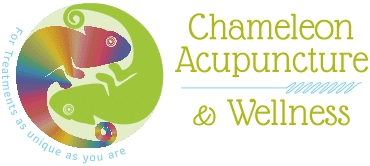Video by the BAcC answering 16 frequently asked questions:
Is the number of health practitioners who offer acupuncture confusing and make you feel unsure who to seek treatment from?
This table summarizes the 5 main types of acupuncture available. Although it is not a definitive list as there are crossovers, it will help you to get a better understanding in choosing the right practitioner for you.
In the UK there are 2 main routes to becoming an acupuncturist:
1) 2-3 years of studying Traditional Chinese Medicine (TCM) at degree level which includes western medicine, anatomy & physiology, pharmacology, and the traditional Chinese medicine theory. This holistic therapy looks at treating the root cause of disease in order to relieve the symptoms.
2) Western Medical (WM) practitioners such as doctors, nurses, midwives, dentists, physiotherapists and osteopaths who are already trained to degree level may take short acupuncture courses. These courses do not contain any TCM concepts instead focusing on relieving symptoms of diseases where acupuncture has been proven to be effective.
Please note that some WM practitioners have also trained in TCM principles.
Both these methods of acupuncture are effective, but it is important to match your expectations with your practitioner.
TYPES OF ACUPUNCTURE
| PRACTITIONER | TRAINING REQUIRED | QUALIFICATIONS | PRINCIPALS | TECHNIQUES USED | USES | REGULATORY BODIES | |
|---|---|---|---|---|---|---|---|
TRADITIONAL CHINESE ACUPUNCTURE |
Acupuncturist | 2-3 years | Diploma in Acupuncture (Dip. Ac.) (2 years study), BSc. (Hons) or Licensed Acupuncturist (Lic. Ac.) (3 years study) (includes anatomy, physiology, pathology & pharmacology) | A holistic method that aims to treat the root cause and notjust symptoms. It looks to restore balance to bodily functions by influencing Qi (vital force). | The practitioner chooses from over 400 points to treat and may employ other traditional techniques such as cupping. moxa and guasha. | Established over 2000 years ago. it can be used for many conditions. Its principle is to treat the root cause of disease and not just the symptoms. | BAcC, ACS, ATCM |
JAPANESE ACUPUNCTURE |
Acupuncturist | 2-3 years | Diploma in Acupuncture (Dip. Ac.) (2 years study), BSc. (Hons) or Licensed Acupuncturist (Lic. Ac.) (3 years study) (includes anatomy, physiology, pathology & pharmacology) | Similar to Traditional acupuncture but uses the more hands on method of palpation to determine the pathophysiological processes that require treatment. | A gentle, superficial needling method where point selection is based on the locations tender to palpation. | Established over 2000 years ago. it can be used for many conditions. Its principle is to treat the root cause of disease and not just the symptoms. | BAcC, ACS, ATCM |
FIVE ELEMENT ACUPUNCTURE |
Acupuncturist | 2-3 years | Diploma in Acupuncture (Dip. Ac.) (2 years study), BSc. (Hons) or Licensed Acupuncturist (Lic. Ac.) (3 years study) (includes anatomy, physiology, pathology & pharmacology) | This system of acupuncture uses the theory of the five elements – Fire, Water, Earth, Wood and Metal, to diagnose and treat patients. | Similar to traditional acupuncture, using over 400 points to treat. Moxa, cupping and guasha may also be used. | Est. in the 1950’s, based on traditional acupuncture treats the same conditions. | BAcC, ACS, ATCM |
WESTERN MEDICAL ACUPUNCTURE |
Doctors, Nurses, Dentists, Vets, Physiotherapists, Osteopaths, Chiropractors | 2-6 weeks | Certificate of Basic Competence (CoBC), Diploma in Medical Acupuncture (Dip. Med Ac.) (in adjunct to other healthcare qualifications) | The use of acupuncture in modern medical care means taking it out of its traditional context and applying it as a therapeutic technique for a limited number of conditions for which it has been shown to be effective. without having to reconcile the underlying theories of modern and traditional medicine. | Uses a selection from 200 points and employs some set protocols to treat symptoms of disease. | Used mainly for pain management & some Western conditions. | BMAS, AACP, BAWMA |
DRY NEEDLING |
Doctors, Nurses, Dentists, Vets, Physiotherapists, Osteopaths, Chiropracters | 2-6 weels | Certificate of Basic Competence (CoBC), Diploma in Medical Acupuncture (Dip. Med Ac.) (in adjunct to other healthcare qualifications) | The use of acupuncture in modern medical care means taking it out of its traditional context and applying it as a therapeutic technique for a limited number of conditions for which it has been shown to be effective. without having to reconcile the underlying theories of modern and traditional medicine. | Needles are inserted into muscular trigger points and joints Treatment focuses on reducing the symptoms. | Used mainly for pain and musculoskeletal conditions. | BMAS, AACP, BAWMA |
Yes. Children and adolescents usually respond very well to acupuncture. Many acupuncturists specialise in paediatric care.
Acupuncture is widely considered to be beneficial for a range of illnesses and symptoms, from clearly defined complaints to more general feelings of ill health and low energy. Take a look at the BAcC research fact sheets to find out more about how traditional acupuncture can help you.
Since acupuncture promotes your body’s own ability to heal itself every patient will respond differently to acupuncture. Some symptoms will resolve after the first treatment while others may take 4-10 treatments. Acupuncture has a cumulative effect on your body with each treatment building on the next. The length of your condition, severity and current state of health overall play a role in how many treatments may be necessary.
Most people find acupuncture to be very relaxing. Patients often describe the g needle sensation as a tingling or dull ache. This is one of the signs the body’s qi, or vital energy, has been stimulated.
No, acupuncture does not hurt. Occasionally, there will be a slight pinch where the needle is inserted almost like a mosquito bite. The size of an acupuncture needle is about the thickness as a strand of hair. Patients will often say that they did not even feel the needle being inserted. Once the needle is in you may feel a heavy sensation, dull ache or slight tingle where the needle has been inserted but this will often dissipate almost instantly. Many patients will feel a deep relaxation and calmness once the needles are inserted and many people often fall asleep while the needles do their work.
Yes, many people have a fear of needles. If someone has concerns, I will only use a minimal number of needles. However, most people who have a fear of needles often do not have a problem with acupuncture needles due to the small size of the needle. Cupping, moxa, massage, or myofasical taping, might be utilized instead of acupuncture.
Acupuncture needles are very much finer than the needles used for injections and blood tests. You may not even feel them penetrate the skin and once in place they are hardly noticeable.
Here is an indication of the size of an acupuncture needle:
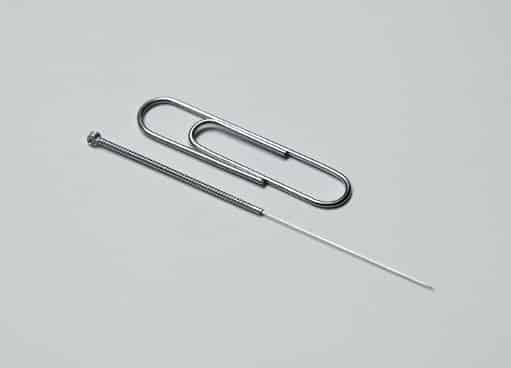
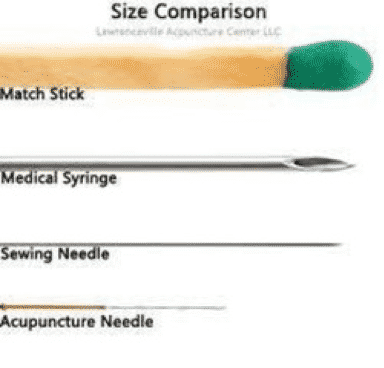
Acupuncture is very safe and has no side effects. It is safe for the elderly, pregnant women, children and those on medications.
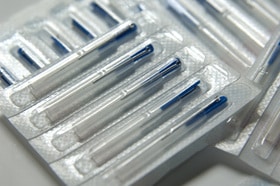 No, only sterile single-use disposable needles are used.
No, only sterile single-use disposable needles are used.
The needle comes in various lengths and widths but rest assured, it’s sharp! – although not so sharp that its point is easily bent. Under the microscope, a good acupuncture needle has a tip that is smoothly rounded to prevent snagging.
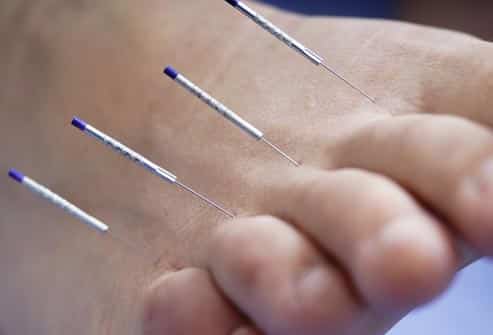 It depends. In some places it might be hardly through the skin or just a couple of millimetres inside. In your buttocks it might be up to 3 inches or 75mms depending on how well built you are. Bear in mind that the actual acupuncture point could be just under the surface of the skin, but in other places is at a depth. To do its work, the needle should make contact with the point, where it can manipulate it for your health.
It depends. In some places it might be hardly through the skin or just a couple of millimetres inside. In your buttocks it might be up to 3 inches or 75mms depending on how well built you are. Bear in mind that the actual acupuncture point could be just under the surface of the skin, but in other places is at a depth. To do its work, the needle should make contact with the point, where it can manipulate it for your health.
If possible Try not to have a large meal within an hour of your appointment as the process of digestion will alter the pattern of your pulse, and you may need to lie on your stomach.
You should also avoid alcohol and food or drink that colours your tongue such as coffee or strong tea.
It is a good idea to wear loose-fitting clothes so that the acupuncture points, especially those on your lower limbs, are easily accessible.
If it is your first appointment, please fill in the relevant New Patient Forms on the prices and pre-booking page.
You are likely to feel relaxed and calm. If the treatment has been particularly strong you may feel tired or drowsy and it is worth bearing this in mind if you plan to drive or use any other machinery soon afterwards.
Acupuncture has virtually no unpleasant side effects. Any that do occur are mild and self-correcting. Occasionally there may be minor bruising at the needlepoint or a short-term flare-up of your symptoms as your qi clears and resettles.
If you are currently receiving treatment from your doctor it is sensible to mention that you plan to have acupuncture. Your acupuncturist will need to know about any medication you are taking as this may affect your response to the acupuncture treatment.
Yes. The acupuncture treatment may enable you to reduce or even stop taking some forms of medication but you should always consult your doctor regarding any change of prescription. DO NOT stop taking medication without professional guidance.
That depends upon your insurer. As the demand for complementary medicine increases more private health insurance companies are beginning to offer cover for traditional acupuncture. You should check your individual policy details.
